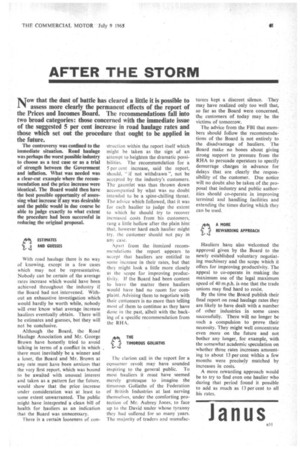AFTER THE STORM
Page 65

If you've noticed an error in this article please click here to report it so we can fix it.
Now that the dust of battle has cleared a little it is possible to assess more clearly the permanent effects of the report of the Prices and Incomes Board. The recommendations fall into two broad categories: *hose concerned with the immediate issue of the suggested 5 per cent increase in road haulage rates and
• those which set out the procedure that ought to be applied in the future.
The controversy was confined to the immediate situation. Road haulage was perhaps the worst possible industry to choose as a test case or as a trial of strength between the Government and inflation. What was needed was a clear-out example where the recommendation and the price increase were identical. The Board would then have the best possible opportunity of assessing what increase if any was desirable and the public would in due course be able to judge exactly to what extent the procedure had been successful in reducing the original proposal.
tfalf4 ESTIMATES 43 AND GUESSES
With road haulage there is no way of knowing, except in a few cases which may not be representative. Nobody can be certain of the average rates increase which would have been achieved throughout the industry if the Board had not intervened. Without an exhaustive investigation which would hardly be worth while, nobody will ever know what average increase hauliers eventually obtain. There will be estimates and guesses, but they will not be conclusive.
Although the Board, the Road Haulage Association and Mr. George Brown have honestly tried to avoid talking in terms of a conflict in which there must inevitably be a winner and a loser, the Board and Mr. Brown at any rate must have been anxious that the very first report. which was bound to be awaited with unusual interest and taken as a pattern for the future, would show that the price increase under consideration was at least to some extent unwarranted. The public might have interpreted a clean bill of health for hauliers as an indication that the Board was unnecessary.
There is a certain looseness of con struction within the report itself which might be taken as the sign of an attempt to heighten the dramatic possibilities. The recommendation for a 5 per cent increase, said the report, should, "if not withdrawn ", not be accepted by the industry's customers. The gauntlet was thus thrown down accompanied by what was no doubt intended to be a spine-chilling threat. The advice which followed, that it was for each haulier to judge the extent to which he should try to recover increased costs from his customers, rang a little hollow after the plain hint that, however hard each haulier might try. the customer should not pay in any ease.
Apart from the itemized recommendations the report appears to accept that hauliers are entitledto some increase in their rates, but that they might look a little more closely at the scope for improving productivity. If the Board had been content to leave the matter there hauliers would have had no room for complaint. Advising.them to negotiate with their customers is no more than telling most of them to continue as they have done in the past, albeit with the backing of a specific recommendation from the RHA.
THE TIMOROUS GOUATHS
The clarion call in the report for a consumer revolt may have sounded inspiring to the general public. To most hauliers it must have seemed merely grotesque to imagine the timorous GoIiaths of the Federation of British Industries at last nerving themselves, under the comforting protection of Mr. Aubrey Jones, to face up to the David under whose tyranny they had suffered for so many years. The majority of traders and manufac
turers kept a discreet silence. They may have realized only too well that so far as the Board were concerned, the customers of today may be the victims of tomorrow.
The advice from the FBI that members should follow the recommendations of the Board is not entirely to the disadvantage of hauliers. The Board make no bones about giving strong support to pressure from the RHA to persuade operators to specify demurrage charges in advance for delays that are clearly the responsibility of the customer. Due notice will no doubt also be taken of the proposal that industry and public authorities should co-operate in improving terminal and handling facilities and extending the times during which they can be used.
A MORE REWARDING APPROACH
Hauliers have also welcomed the approval given by the Board to the newly established voluntary negotiating machinery and the scope which it offers for improving productivity. The appeal to co-operate in making the maximum use of the legal maximum speed of 40 m.p.h. is one that the trade unions may find hard to resist.
By the time the Board publish their final report on road haulage rates they are likely to have dealt with a number of other industries in some cases successfully. There will no longer be such a compulsion to prove their necessity. They might well concentrate even more on the future and not bother any longer, for example, with the somewhat academic speculation on whether three rates increases amounting to about 13 per cent within a few months were precisely matched by increases in costs.
A more rewarding approach would be to try to find even one haulier who during that period found it possible to add as much as 13 per cent to all his rates.




















































































































